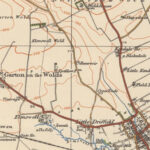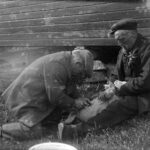11 May 1641: William Simpson of Little Driffield takes a break from threshing to shear Henry Best’s sheep at Elmswell
Henry Best. 1857. Rural Economy in Yorkshire, in 1641. Ed. Charles Best Robinson. Durham: Surtees Society. Get it:
.Unedited excerpt
If an excerpt is used in the book, it will be shorter, edited and, where applicable, translated.
Our fatte sheepe, beinge washed on Munday the 9th of May, weare clipped on Wensday the 11th of May; wee had onely one clipper, viz; William Simpson of Little Driffield, whoe threshinge heare the day afore, wee spoke to him att night when he wente hoame that hee should the nexte morninge bringe his sheares with him; then in the morninge he fell to threshinge till such time as wee had gotte the sheepe up and all thinges ready. Wee imployed onely the clipper and our foreman aboute this businesse; the foreman first brought sixe barres which he sette two in length and double on one side, for the lime leare ende (?) fenced in one side, the hedge another, the foresayd fower barres the third side, and for the ende that was next the markinge potte, wee made choise of two of the straitest and strongest barres, which stood single, and weare not sette downe nor made fast till such time as the sheepe weare putte into the penne: when he had thus done hee fetched the markinge-potte and sette it over the hole, and made a fire under, and then wee sente for the clipper, whoe came and made a cleane place whearon to lay his sheepe, pickinge all stickes, strawes and other dirte of the grasse; hee allsoe tooke a doore of the hinges, and fetched a creele for the doore to lye upon, on which they weare to winde the woll; hee allsoe looked to the fire till our foreman gatte his breakfast; hee beganne not to clippe till after our plough folkes had gotten theire breakefasts, and hee had done the aforesayd thirty two soone after twelve of the clocke: the foreman trayled the sheepe from the penne to the shearer, wounde up the woll, and helde them till they weare marked; wee allwayes marke them ourselves, wee gave our fatte sheepe and fatte lambes onely the botte. Ever when the foreman sawe that the clipper had allmost done, hee left and went and fetched him another, and cast it for him, and then tooke the sheepe that was shorne and brought it to the markinge-panne, and nowe and then, when hee had any time, fetched a lambe to marke. Wheare the coates weare whole wee made fleeces of them, but wheare woll was lackinge there wee putte those coates into two fleeces; wee gave him charge that hee should winde them very fast, for there is greate losse by loose windinge, and with all that hee should not double them in too much, for besides that the longe fleeces weigh the best, the wollman is allsoe desirous of a longe fleece; wee made of that woll 25 fleeces which weighed aboute five stone and a halfe; the clipper had after 4d. a score; aboute eleaven of the clocke wee sente in for a canne full of the best beere for him and the foreman, and when they had done sette them to dinner togeather, settinge before them fower such services as had beene provided for our owne servants, onely wee gave them of the best beere; after dinner the clipper wente to threshinge againe, and was payd for halfe a dayes worke three pence besides what his wages came to for clippinge; wee clipped them thus soone partly because of theire better feedinge, for they will mende of their carkesses better by farre when theire coates are of then when they are on, as not beinge so much molested with lice, and given to rubbinge; besides, beinge not kept over hotte with the weight and closeness of theire woll, they will have a better minde to take paines and labour on the grownde: then againe, wee accounte Whitsuntide a very good time for puttinge of fatte lambes, and such fatte sheepe as weare not fatte enough to kill against Easter; and therefore beinge shorne aboute the 8th or 10th of May, and Whitsuntide beinge aboute the 28th or 30th of May theire undergrowth will bee come to some perfection, and make them shewe rownder and better like. Wee putte up tuppes to feedinge att Martynmasse, which wee supposed to bee then worth 58. a peece; we sold two of them the 10th of May for 12s. a peece; they weare fetched away on Thursday the 12th of May; theire skinnes weare after solde for two shillinges a peece; and weather-mutton of that bignesse and fatteness could not have beene bought for 38. 4d. a quarter, not att this time of the yeare, besides above fower pownde of suitte that was in the kell of each of them; such as can conveniently gette weathers fedde against Easter shall finde profitte enough by soe doinge, for then all fatte goods are in request. See more of this subjeckt in the beginninge of the second booke before agriculture.
Comment
Comment
In contrast, Sir Moyle Finch employed 49 shearers at once and paid 6d to a piper to play the old English pipes all day (op. cit.).
Something to say? Get in touch
Similar
 22 November 1641: Snow falls at Elmswell (Driffield), and sheep farmers jostle for low ground and feed
22 November 1641: Snow falls at Elmswell (Driffield), and sheep farmers jostle for low ground and feed 6 June 1641: Under a waning gibbous moon, armed with a penknife and sticky-willy unguent, a shepherd castrates Henry Best’s lambs at Elmswell (Driffield)
6 June 1641: Under a waning gibbous moon, armed with a penknife and sticky-willy unguent, a shepherd castrates Henry Best’s lambs at Elmswell (Driffield)
Comment
Comment
Do read what comes next, about mortar.
Something to say? Get in touch
Search
Donate
Music & books
Place-People-Play: Childcare (and the Kazookestra) on the Headingley/Weetwood borders next to Meanwood Park.
Music from and about Yorkshire by Leeds's Singing Organ-Grinder.


 Bluesky
Bluesky Extwitter
Extwitter